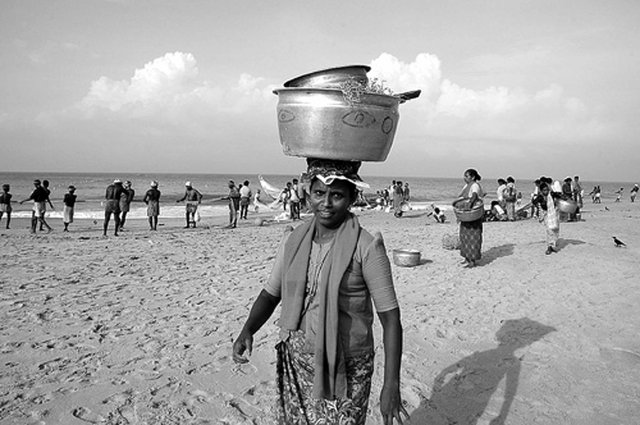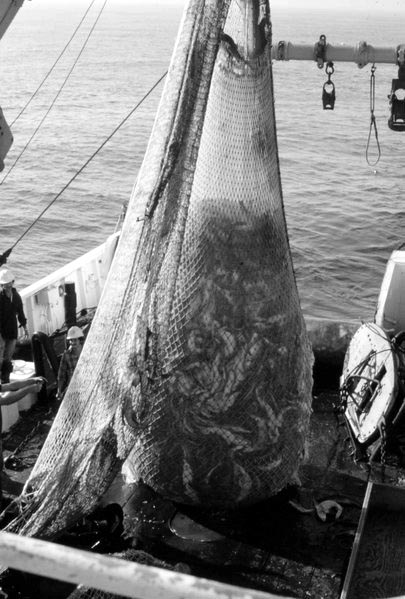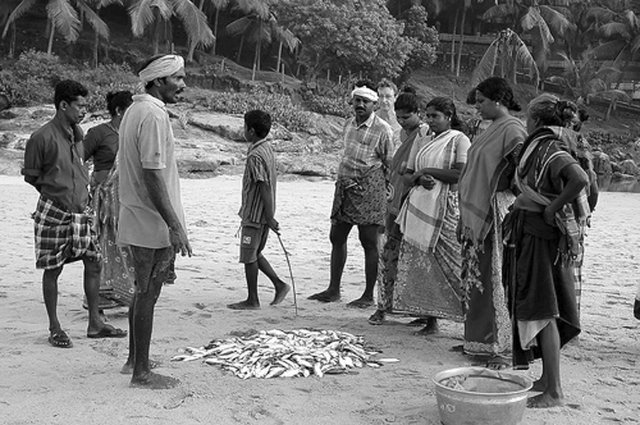 Fisherwomen in Kerala Fight Back
Fisherwomen in Kerala Fight Back
In India, it is estimated that there are 5.4 million people fully engaged in fisheries activities. Of these, 1.6 million are fisherwomen and more than a million come from the 222 fishing villages in the State of Kerala in the south of the country. Meanwhile, about 200,000 people, many of them women, depend on supplementary professions like processing and marketing of fish for their survival.
The adventhas globalisation and modernisation of brought radical changes in the fisheries sector both at the national and regional levels. Production has been largely transposed from the communities to industries, adding more to the cultural strains on fisherwomen who face threats of abuses in far marketplaces and on the streets.
Yet the women have consistently resisted various forms of imposition, restriction and repression emanating from a more complicated access to marine goods, infrastructure and systems. Through untiring pickets, strikes and other civil mass actions, dialogues with the government and other groups happened and the fisherwomen have been recognised as stakeholders in the process.
The Impact of Globalisation on Fisherwomen
In south Kerala, women used to collect and sell the fishes caught by the community’s men. They perform the difficult function of selling a highly perishable commodity like fish in most of the coastal villages where chilling and freezing facilities are least available. Their business is a story of fluctuating fortunes. Fishing has been a subsistence support base for traditional fish workers. But when fishing activities are expanded and mechanised, the production is taken over by men. Modern technological facilities are also controlled by men.
Mechanisation has drastically limited the role of women and men in the fishing business. Big contractors and merchants run most fish markets. The reduction of human resource means that men are losing their jobs and for some, are indulging in irresponsible activities like drinking liquor and gambling. This also means that women are taking on the role of earning income to satisfy the domestic needs and other unexpected expenses. Big corporations likewise pose a threat to the traditional fish sellers. With their huge capital and technological resources, they can easily capture the fisheries business quite fast.
Today, women have to wake up much earlier in the morning to travel miles and miles for their fishes, rushing through one catch centre to another. The routine is also dependent on the contractor they are obliged to patronise. With the prices dictated by the contractors and the resources they invest to access these goods, they feel a greater pressure to sell these goods in the market.
Globalisation has also created a great divide between men and women with regard to their access to modern facilities. Men have access to most technological gadgets like mobile phones, two-wheelers, boxes to carry fish, among others. Through their mobile phones, they obtain quick information about the availability of fish and price rates from any coast at any time. Meanwhile women have no access to these facilities and tools due to economic and cultural reasons. Although the conditions in the markets have improved for better, gender discrimination still exists as modern technological facilities and freedom of movement are accessible only to men even in ideal markets.
The fishing industry has also absorbed more men as head load workers, agents and fish sellers, following the Kuwait and Iraq wars. In a short span of time they took hold of the markets which resulted in the massive displacement of fisherwomen. Today, majority of women sell fish outside the markets or on a door-to-door delivery system.
Organising women and other members of fishing communities has been a key in checking the industrial aggression against the small fishing communities as well as the seas. The Kerala fish workers federation, Kerala Swathanthra Matsya Thozhilali (KSMT), has actively worked for the rights of fishworkers for decades. By the end of 1980s, its women members decided to form a women’s wing of the federation: the Theeradesa Mahila Vedi (TMV).
 TMV has been actively involved in various women’s issues, spearheading many historical agitations that have influenced and changed government policies. These issues include the discrimination against fisherwomen in transportation; the lack of basic market and sanitary facilities for women; and the gender- based violence from a skewed fish trading system.
TMV has been actively involved in various women’s issues, spearheading many historical agitations that have influenced and changed government policies. These issues include the discrimination against fisherwomen in transportation; the lack of basic market and sanitary facilities for women; and the gender- based violence from a skewed fish trading system.
Struggle for Special Buses
The lack of transportation was a major impediment for women selling fish in the 1980s. As they were not allowed to travel on public transportation with their fish baskets and other utensils, women had to walk miles to reach the market with a heavy load on their shoulders and their homes late in the evening.
TMV led a protest march on the streets; pickets at bus stands; strikes directed at public transport and government vehicles, dharna or fasting in front of government offices for four to five years, until the government relented. Special buses were provided for fisherwomen.
But this overdue initiative also encountered problems. By 1991 the government put the buses under the control of an apex body that consisted of cooperative societies, without guaranteeing funds for the operations of these special buses. This led to the buses’ poor maintenance, charge hikes, canceled trips and lack of insurance. Neither was there a budget for the purchase of new buses nor for the compensations for victims and survivors of road accidents.
In the 1980s, as they were not allowed to travel on public transportation with their fish baskets and other utensils, women had to walk miles to reach the market with a heavy load on their shoulders and their homes late in the evening.
TMV organised a series of mass actions once again until the bus administration sat with the women and agreed with the latter’s demands. It also created village committees of fisherwomen who traveled by bus to strengthen their position when lobbying as a group. In 2004, 500 fisherwomen picketed at the office of the bus administration for hours and resisted arrests until the administration showed willingness to discuss the issues of negligence and callousness in the bus operations.
Magline Peter, leader of the protests asserted, “We know our women are politically conscious. That’s why they are able to show tremendous energy and courage in the phase of agitations.” Freesca Kurisappan, a veteran fisherwoman leader added, “After this whole issue of transportation was resolved to a certain extent, the family life of our women had drastically changed. Now they are able to get back home in the afternoon and find time to look after the domestic activities and the needs of their children and husbands. Their health also had been substantially improved which in turn gave them more energy to be available to the family. Peace prevails in place of discord of early days.”
As a result of this historic struggle and the awareness campaign by the fisherwomen, many organisations and even some Panchayats or village councils have started exclusive bus routes for women.
Fish Markets Recaptured
The infrastructure and conditions in the fish markets are pathetic everywhere in Kerala. Fish markets are generally unhygienic places. Although women comprise a major group among the fish sellers in the markets, they are unjustly denied whatever little amenities provided in the market. The blatant gender discrimination happens as the dirtiest and unnoticed corners of the markets were allocated to women. They are not even given tables where they can display their fishes. Women are also denied basic facilities and services such as water pipes, pure drinking water, ice boxes or freezers as well as a separate toilet and room for changing clothes. They are often harassed and even tortured by the goondas or ruffians appointed by the contractors to collect the rent from the sellers.
TMV decided to take up these, starting with the Sreekaryam Panchayat market and its conversion into a model market. This market now has basic facilities, which other markets need to replicate. But as in the struggles in the past, this was not easy.
TMV then worked on the wholesale market of Pangodu where fisherwomen collect fish for sale. Most fisherwomen used to reach the market by 3:30 in the morning for the auction. However fish theft, cheating and physical attacks against them by goondas prevented fisherwomen to obtain goods that they can sell in the cities.
A committee comprising of agents and fisherwomen was formed to discuss these issues. The committee later decided that the auction would only begin after 6 in the morning and the end of the goondas menace. It also met with the police commissioner who performed surveillance.
The Mavelikkara market likewise lacked adequate and hygienic facilities. Physical attacks from the goondas were common on those who refused to pay the unfair tax amount. However, the contractor refused to show much interest in the women’s complaints. Realising that they have to stand together to face these injustices, the fisherwomen organised a number of agitations that forced the municipal authorities and police to take immediate action. After several consultations, the contractor agreed to reduce the tax tariff and finally handed over the control of the market, including tax collection to the fisherwomen’s committee and KSMT. Since then, the market has enjoyed better work conditions and basic facilities.
TMV also took up the issue of unfair tax collection by the contractors in other markets. Protests were organised in all the markets demanding fair tariff and a halt to violence and other atrocities. After many consultations among the contractors, officials and fisherwomen on different levels, the tariff rates were reasonably cut down and the women were assured safety and protection inside the market premise. Today the women are more vigilant and politically conscious than ever.
 TMV also organised protests against the violent clearing of roads in Kesavadasapuram. In 2005, the police demolished the makeshift stalls of fisherwomen and vegetable vendors in the name of the campaign “Clean City, Green City.” Fishes and other goods and tools were also seized.
TMV also organised protests against the violent clearing of roads in Kesavadasapuram. In 2005, the police demolished the makeshift stalls of fisherwomen and vegetable vendors in the name of the campaign “Clean City, Green City.” Fishes and other goods and tools were also seized.
On one occasion, the women, carrying fish baskets on their heads, marched towards the corporation’s office and demanded fair dealings and their right to sell fish on the waysides. The agitators were arrested and taken to the police station. Finally, the mayor intervened and assured them that they could continue selling fish on the waysides.
Violence and Discrimination against Fisherwomen in Other Situations
Aside from taking up the issues of fisherwomen in their line of work, TMV has also stepped into the issues their members and other women face at the home front. Violence and sexual harassment against fisherwomen are on the rise. Much of domestic violence is not even considered as violence against women while sexual harassment is not reported due to fear of social stigma. Even reported cases are not given serious attention, that culprits can escape using political influence or threatening the sur vivors with dire consequences.
TMV has assisted fisherwomen in difficult situations and pursued cases that led to the arrest and prosecution of culprits. “Today our women are more vigilant and conscious about all kinds of violence and sexual harassment against them. They have grown in confidence and have the courage to fight until the end. They also have developed the capacity to deal with the officials and police,” Magline Peter remarked.
Safety Nets in Times of Hunger
TMV has also insisted the inclusion of fisherwomen in the financial and insurance schemes of the government in response to the famine stricken months and deaths due to accidents respectively. In 1992, the fisherwomen, with the support of the fish workers union, started an agitation in front of the secretariat’s office, setting up thatched huts where they cooked food and slept there for 15 days until their demands were addressed by the government.
From a practical experience, the women knew that a male member of a family would not share the whole amount for domestic purposes. But a female member, they believe, would definitely share the entire amount with the family. Moreover, an important rationale behind their demand was to be recognised as fish workers. Accepting fisherwomen as fish workers has definitely enhanced their social and economic status.
Women in disaster and emergency situations
Gender discrimination and women’s marginalisation are also intense in disaster and emergency situations. With the tsunami that swept coastal South India in December 2004, shelter became a major issue for women. The temporary shelters had no privacy while the sanitation facilities were in a bad state.
Life in the relief camps was cause of trauma for women. Separate toilets, recreation space, cooking sheds, firewood storage facilities, place for drying clothes and space for cleaning kitchen utensils were among the major concerns for women. But with the dominant norms of socialisation, women were too hesitant to insist or even express their needs. Instead, they silently cope with several problems, including sexual and physical harassment by men in the camps, particularly near the toilets.
During disaster and emergency situations, pregnant and lactating mothers also failed to obtain adequate nutrition and access healthcare facilities. Inadequate supplies of water and sanitation made women susceptible to reproductive and urinary tract infections. Women and girls often opt not to avail of medical services which are organised in the relief camps as the doctors are all male and the facilities lack privacy.
Because of their loss of income and inability to access cash, women are at risk of sexual exploitation and dependency. Orphaned girls are married off at young ages by relatives or community members, who refuse the responsibility to care for them. The vulnerability of women is further accentuated by gender-insensitive relief and rehabilitation policies.
Women’s work is also not recognised in most rehabilitation programmes. Livelihood rehabilitation measures focused more on the loss of boats, thus ignoring the livelihood issues of women who are involved in processing and marketing of fish. Often relief and rehabilitation packages are based on lists made by the Fisherfolk Panchayats, which are the turf of men, resulting in women’s exclusion from the relief measures.
This blatant disregard for women’s livelihood concerns could prove disastrous for the poor, because many women may are the sole earners in their families. It is widely known that women’s earnings generally go directly towards meeting the basic needs of their families, while a substantial proportion of many men’s earnings is often spent on personal habits such as drinking, smoking and gambling.
As households are usually registered under a man’s name, women encountered problems in accessing rations and compensations for assets that were lost. Experience shows that it is vital to collect gender-disaggregated information before determining relief and rehabilitation packages.
Protecting women from sexual exploitation and preventing the of creation of dependencies are of prime importance. But it is also crucial to perceive women as citizens with specific perspectives and not just vulnerable victims. Women’s livelihoods and earning opportunities must also be prioritised. Further, the long-term impact of the change in gender balance must be considered in the formulation of all policies and programmes to promote women’s rights and protect their interests.
The women leaders and activists of the fish worker’s movement were actively involved in the relief and rehabilitation work, which developed soon after the tsunami. They stayed day and night in the villages, organised several awareness campaigns and formed village-level committees, which monitor the relief and rehabilitation activities and negotiate with the authorities.
TMV and political empowerment
Through the years, TMV has become a movement of marginalised fisherwomen struggling for survival. The process of protecting the economic security of fisherwomen itself is a major political exercise. As a community dependent on the resources from the sea, the political process of the struggle is intertwined with ecological concerns, economic security and gender dimensions.
The struggle of the TMV has come a long way. Its future depends on the nature of political support and solidarity this movement receives from all other women’s groups and the str ug gles of other marginalised communities.





 The
The 
 Isis Resource Center holds one of the largest feminist collections of materials in the Global South. With 40 years of publication experience, Isis holds a vast collection.
Isis Resource Center holds one of the largest feminist collections of materials in the Global South. With 40 years of publication experience, Isis holds a vast collection.